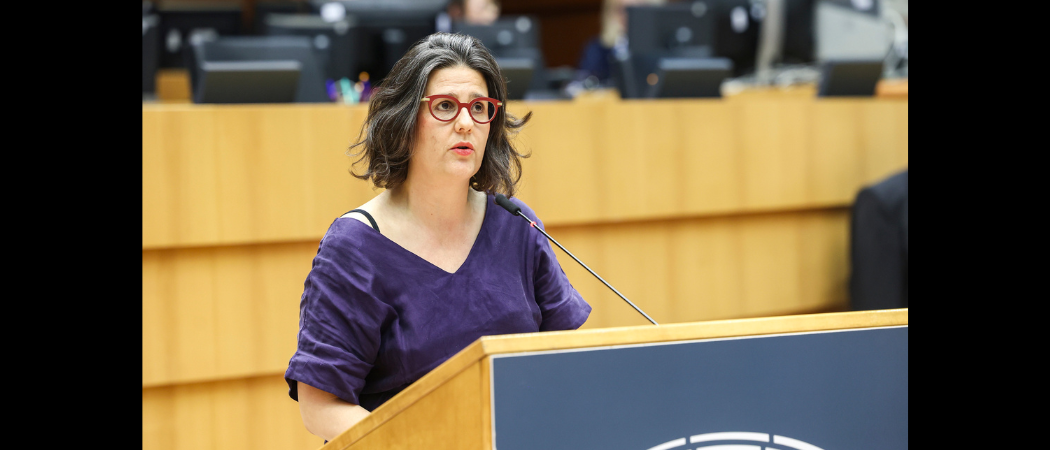French MEP Gwendoline Delbos-Corfield has a ‘creative’ answer to the current stalemate, saying rule of law concerns could be circumvented by handing the management of EU research funding to an independent body

MEP Gwendoline Delbos-Corfiel, the European Parliament’s Hungary rapporteur. Photo: Alexis Haulot / European Union
The EU ban on some Hungarian universities receiving Horizon Europe and Erasmus+ funding because of rule of law concerns should be lifted, with management of the money outsourced to an independent body, the European Parliament’s Hungary rapporteur has said.
French MEP Gwendoline Delbos-Corfield of the Greens/EFA thinks the ban is punishing Hungarian researchers who are caught up in the political stalemate between Budapest and Brussels – and that it also goes against the solidarity principles of the EU.
“These funds are the ones conveying European values, helping to have people in Hungary invested in European projects. By freezing these, the EU is punishing itself,” she told Science|Business.
The EU banned more than 30 Hungarian institutes, including 21 universities, from receiving Erasmus+ and Horizon Europe funds last December over concerns about their autonomy from the government.
The structures of the universities have gradually been overhauled by government edict over the past few years, transferring their management to public trust foundations and placing a great deal of control in the hands of a board of trustees made up of members that were initially hand-picked by the government.
This ban is separate, though linked, to a wider freeze by the EU on Hungary accessing €22 billion in cohesion funds – including €1.5 billion designated to improve Hungary’s research and innovation performance – over various concerns such as judicial independence, a perceived anti-LGBTQ+ law, academic freedom and asylum laws. Hungary is also blocked from receiving €5.8 billion in loans and grants from the EU’s post-COVID recovery package.
Delbos-Corfield believes that the EU could try lifting the Horizon Europe and Erasmus+ ban as a test for breaking the wider political impasse between Brussels and Budapest.
On a trip to Hungary in October she heard from many people – especially ambassadors – that the ban is having a negative impact on students and university staff. Along with John Morijn, a fellow in law and public policy at the Princeton School of Public and International Affairs, Delbos-Corfield came up with the suggestion of creating of an independent, intermediary body, either inside Hungary or outside, that would be overseen by the European Commission and in charge of managing the funds, circumnavigating the institutions whose independence is in question.
Delbos-Corfield’s main frustration is that no one in Hungary, the Commission, or other member states, seems interested in ending the impasse. “This is a creative idea, it doesn’t mean it will happen tomorrow,” she said.
She is supported by others in the Parliament, including Hungarian MEP Katalin Cseh of Renew Europe Group who told Science|Business this is the way to go to help universities that are being “suffocated” by Hungarian Prime Minister Viktor Orbán’s regime.
“I think the Commission has to explore all options that are on the table that allows it to help EU citizens and ensures the best for science, innovation and the movement of students in Europe,” she said.
Little to report
On Tuesday, European budget commissioner Johannes Hahn told Parliament’s Budgetary Control committee that despite it being nearly one year since the ban was implemented on 15 December, progress is scarce.
“Unfortunately, it is the seventh of November, there is nothing more to add,” he said. “There are still talks but not any kind of satisfying development that might enable us to […] have a positive assessment,” adding, “The ball is very much in Hungary’s court to unblock the various issues.” EU funds will not flow to Hungary “in the absence of the necessary repairs,” Hahn said.
However, concerns are growing that the Commission might offer Hungary concessions to get it on side with an EU proposal for a €50 billion facility to support Ukraine’s recovery following Russia’s full-scale invasion last year. Orbán is opposed to this, citing concerns over the treatment of Hungarian minorities in Ukraine.
Delbos-Corfield and Morijn’s idea has not convinced everyone. Attila Havas from the Hungarian Academy Staff Forum (HASF), an association of researchers, said he was surprised to hear about the idea, noting that in 2021, Hungary missed out on over €200 million in grants from Norway, Iceland and Liechtenstein because Orbán did not agree with the choice of entity to disburse some of the money which was earmarked for civil society.
This shows “how unrealistic” Delbos-Corfield’s proposition is, Havas said. “This is a daydream to believe an independent organisation can be set up [to manage EU finances in Hungary] while Orbán is still prime minister.”
Setting up an independent management organisation outside Hungary might work, but Havas doubts the EU would do this as it would be costly and time-consuming. “Also, in this hypothetical case, university staff members taking Horizon Europe money from this independent organisation might face revenge from Orbán in one way or another,” he said.
Havas wants the EU ban to be maintained. “As long as these universities are under the control of governing boards of special foundations, HASF believes it would be a bad idea - a wrong signal - to release the funds.”
While on the surface Hungary’s university management boards are indistinguishable from counterparts elsewhere, there are significant differences as discussed in this article published by HASF.
The European Commission stated in its 2022 rule of law report on Hungary that over 70% of the management board members have, “links to the current government or personally to the prime minister, including current and former ministers and state secretaries, government commissioners, managers of the central bank, members of parliament, (deputy) mayors, vocal members of pro-government groups, relatives […].”
Hungary has made some changes following the December 2022 EU ban. For example, earlier this year seven active government ministers stepped down from various university boards. Havas is unconvinced by this. “That just shows that these governing boards are controlled by Orbán; if he says you resign, you resign. They are now replaced by other cronies,” he said. “Nothing has been done to fix the fundamental problem. The simplest solution is to demolish these foundations […] and give back full autonomy to the senates.”
The European Council, which agreed to the Horizon Europe and Erasmus+ funding ban, is obliged to re-assess its decision within one year.
For Delbos-Corfield, the time for trying to solve these issues through bureaucracy is over. “We need political solutions,” she said. “I think it’s time to release some of the funds but have scrutiny on implementation.”
The Hungarian government has not responded to a Science|Business request for comment.





 A unique international forum for public research organisations and companies to connect their external engagement with strategic interests around their R&D system.
A unique international forum for public research organisations and companies to connect their external engagement with strategic interests around their R&D system.